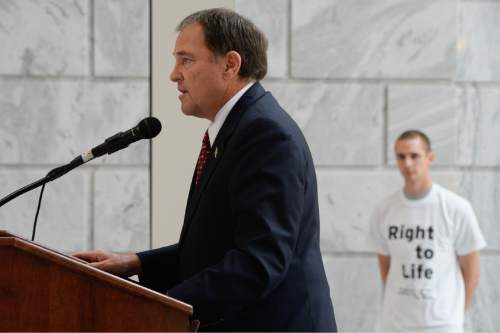This is an archived article that was published on sltrib.com in 2015, and information in the article may be outdated. It is provided only for personal research purposes and may not be reprinted.
The state has formally rebutted Planned Parenthood's claims that its constitutional rights were violated when Gov. Gary Herbert cut off federal funds.
The state argues that it had "unbridled discretion" to end contracts for three programs, including an after-school sex-education program, a network that monitored sexually transmitted diseases, and an STD testing program, according to a memorandum filed Friday in the U.S. District Court for Utah. A fourth contract, for another after-school program, was allowed to expire at the end of September.
On Sept. 29, U.S. District Judge Clark Waddoups blocked Herbert's order to cut off more than $200,000 in federal money going to Planned Parenthood in the state after the release of videos secretly recorded by a California anti-abortion group. The videos show Planned Parenthood officials in Texas and other states describing how they provide fetal tissue from abortions for medical research.
Tyler Green, solicitor general for the Utah attorney general's office, said in court last month that Herbert has not claimed that any Utah Planned Parenthood officials were involved in the fetal tissue discussions. However, Herbert was concerned that the national Planned Parenthood organization may be "coloring outside the lines," Green said then.
Planned Parenthood sued Herbert, claiming his order unfairly discriminated against the agency and "violated Planned Parenthood's constitutional rights," including equal protection and due process granted by the 14th Amendment.
But in its almost 40-page memorandum, the state argues that its "termination of the four disputed contracts does not implicate any constitutionally protected activity," and that abortion alone didn't motivate Herbert to cut off funding.
"It was instead his 'outrage' at the 'video where they're selling fetus body parts for money,' … and 'the casualness, the callousness' such actions evinced," the memorandum reads. "Whatever might be said about the act of selling fetal tissue for money, that act … is not constitutionally protected."
An evidence hearing is scheduled for Thursday.
— The Associated Press contributed to this story.
Twitter: @MikeyPanda



